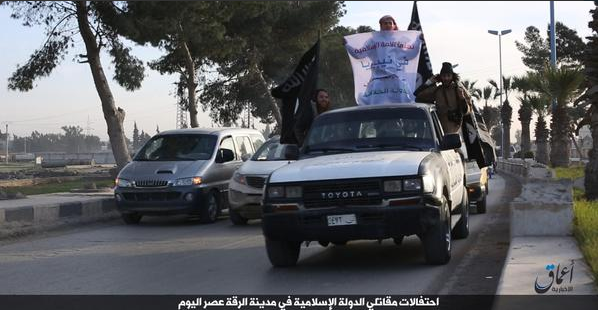How The ISIS Allegiance Application Process Works For Groups Joining The 'Caliphate', Like Boko Haram

The Islamic State group has reportedly accepted a pledge of allegiance from Nigeria-based Boko Haram, according to an audio recording released Thursday claiming to be from an Islamic State group spokesperson. If the recording is authentic, Boko Haram becomes the largest and most lethal jihadi group to be inducted into the Islamic State group's network.
On Saturday, Boko Haram leader Abubakar Shekau released an audio recording declaring his loyalty to ISIS caliph Abu Bakr al-Baghdadi, but there was no official alliance until now. The formal acceptance, contained in a message purporting to be from ISIS spokesperson Mohammad Al-Adnani, changes the picture. Dozens of jihadist groups around the world have professed their allegiance to al-Baghdadi, but ISIS maintains a strict application process in order to be officially considered one of the so-called caliphate's wilayat (provinces) and receive ISIS support.
A jihadist group asking to be taken under the ISIS banner must publicly declare its allegiance to al-Baghdadi, and the pledge must be documented and shared. If there is more than one jihadist brigade in the area, the pledge must come from a unified body, demonstrating that they are able to operate together and consolidate forces into one ISIS wilayat.
While there is no preference for how a group presents an allegiance declaration, some groups have been praised for taking the opportunity to urge other Muslims to declare their loyalty to Baghdadi. Boko Haram's pledge of loyalty did precisely that. The one from the Shura Youth Council in Libya also did, and its pledge of allegiance was “worthy of being written in gold,” according to ISIS propaganda magazine Dabiq.
Once consolidated as part of the so-called caliphate, the group must nominate a wali, or governor, and a Shura council, the religious leadership, according to Dabiq. The leaders must also demonstrate their willingness to implement ISIS’ version of Sharia law in their region. It is likely that ISIS leadership in Syria and Iraq has some say in this selection process. In the past the militant group has sent small delegations of fighters into countries likely to sympathetic to ISIS to lay the intial groundwork for expansion.
Earlier this week ISIS released a photo report from its de facto headquarters in Raqqa, Syria, showing militants celebrating the creation of “wilayat Nigeria” and the inclusion of Boko Haram.
After the group has chosen its leaders, it must come up with a military strategy and a plans for future operations that would allow ISIS to consolidate territory in the region -- a territory that the group would actually be able to govern. The military proposal must then be presented to ISIS leadership for approval.
“The policy of the Islamic State is known,” according to Dabiq. “it does not give any person or group permission to announce a wilāyah or present themselves as officials representing the Islamic State leadership until the aforementioned process has concluded.”
Once allegiance has been declared, groups will often carry out an attack or act of brutality that they will document and share as a sign of loyalty and commitment to ISIS. When Sinai-based jihadist group Ansar Bait al-Maqdis (ABM) pledged allegiance to ISIS, it carried out one of the deadliest attacks on Egyptian security forces since Mohammed Morsi was ousted fom the presidency in 2013. ABM did not officially claim responsibility for the attack until after ISIS accepted its allegiance.
“ISIS is choosing groups that are already active in conflict zones and helping them to gain power and perhaps territorial control more easily,” said Harleen Gambhir, counterterrorism analyst at the Institute for the Study of War. “It’s more a matter of ISIS tailoring its strategy within each wilayat to whatever the regional fight is, to help their affiliates have the most power.”
© Copyright IBTimes 2025. All rights reserved.






















